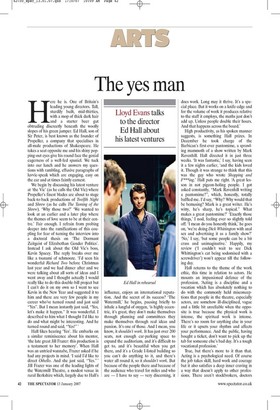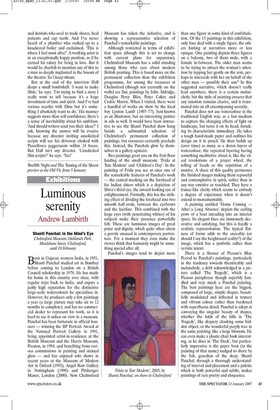The yes man
Lloyd Evans talks to the director Ed Hall about his latest ventures Here he is. One of Britain's leading young directors. Tall, sturdily built, mid-thirties, with a mop of thick dark hair and a starter beer gut obtruding discreetly beneath the woolly slopes of his green jumper. Ed Hall, son of Sir Peter, is best known as the founder of Propeller, a company that specialises in all-male productions of Shakespeare. He takes a seat opposite me and his shiny popping-out eyes give his round face the genial eagerness of a well-fed spaniel. We tuck into our lunch and he answers my questions with rambling, effusive paragraphs of luvvie-speak which are engaging, easy on the ear and at times faintly earnest.
We begin by discussing his latest venture at `the Vic' (as he calls the Old Vic) where Propeller's finest blades are about to stage back-to-back productions of Twelfth Night and Shrew (as he calls The Taming of the Shrew). 'Why those two?' We wanted to look at an earlier and a later play where the themes of love seem to be at their centre.' Fair enough. I refrain from probing deeper into the ramifications of this coupling for fear of turning the interview into a doctoral thesis on 'The Dormant Zeitgeist of Elizabethan Gender Politics'. Instead I ask about the Old Vic's boss, Kevin Spacey. The reply breaks over me like a tsunami of schmooze. 'I'd seen his wonderful Richard Two before Christmas last year and we had dinner after and we were talking about all sorts of ideas and I went away and I thought actually I would really like to do this double-bill project but I can't do it on my own so I went to see Kevin in the New Year and suggested it to him and there are very few people in my career who've turned round and just said "Yes". But I mean instantly just said, "Yes, let's make it happen." It was wonderful. I described to him what I thought I'd like to do and what might be interesting. And he turned round and said, "Yes!"' Hall likes hearing 'Yes'. He embarks on a similar reminiscence about his mentor, `the late great Jill Frazer: this production is a testament to her memory'. When Hall was an untried wannabe, Frazer asked if he had any projects in mind. 'I said I'd like to direct Othello. And she just said, "Yes."' Jill Frazer was one of the leading lights of the Watermill Theatre, a modest venue in rural Berkshire which, largely due to Hall's influence, enjoys an international reputation. And the secret of its success? 'The Watermill,' he begins, pausing briefly to inhale a lungful of oxygen, 'is highly eccentric, it's great, they don't make themselves through planning and committees they make themselves through real ideas and passion. It's one of those. And I mean, you know, it shouldn't work. It has just over 200 seats, not enough car-parking space to expand the auditorium, and it's difficult to get to, and it's beautiful when you get there, and it's a Grade I-listed building so you can't do anything to it, and there's water all round it, so it shouldn't work. But because of the people there and because of the audience who travel for miles and who are — I have to say — very discerning, it does work. Long may it thrive. It's a special place. But it works on a knife-edge and for the volume of work it produces relative to the staff it employs, the maths just don't add up. Unless people double their hours. And that happens across the board.'
High productivity, as his spoken manner suggests, is something Hall prizes. In December he took charge of the Barbican's first-ever pantomime, a sprawling mammoth of a show written by Mark Ravenhill. Hall directed it in just three weeks. 'It was fantastic,' I say, having seen it a few nights earlier, 'and the kids loved it. Though it was strange to think that this was the guy who wrote Shopping and F***ing.' Hall puts me right. 'A great lesson in not pigeon-holing people. I got asked constantly, "Mark Ravenhill writing a pantomime?", which, honestly, totally baffled me. I'd say, "Why? Why would that be bemusing? Mark is a great writer. He's witty, he's sharp, he's topical." What makes a great pantomime9"Exactly those things,' I nod, feeling ever so slightly told off. 'I mean do you honestly think,' he goes on, 'we're doing Dick Whittington with anal sex and advertising it as a family show?' 'No,' I say, 'but some people can be a bit crass and unimaginative.' Happily, my review (I couldn't wait to see Dick Whittington's cat being sodomised with a screwdriver') won't appear till the following day.
Hall returns to the theme of the work ethic, this time in relation to actors. He mounts an impassioned defence of the profession. 'Acting is a discipline and a vocation which has absolutely nothing to do with the commonly held misconceptions that people in the theatre, especially actors, are somehow ill-disciplined, vague and a little bit unreliable when the opposite is true because the physical work is intense, the spiritual work is intense. There's no room for anything else in your life or it upsets your rhythm and affects your performance. And the public, having bought a ticket, don't want to pick up the tab for someone else's bad day. It's a tough vocational profession.'
True, but there's more to it than that. Acting is a psychological need. Of course the job takes skill, hard work and courage but it also satisfies a deep inner craving in a way that doesn't apply to other professions. There aren't stockbrokers, doctors and dentists who need to trade shares, heal patients and cap teeth. And I've never heard of a plumber who rushed up to a knackered boiler and exclaimed, 'This is where I feel most alive!' A working actor is in an exceptionally happy position, as if he earned his salary for being in love. But it would be churlish to mention any of this to a man so deeply implanted in the bosom of the theatre. So I keep shtum.
But at the end of the interview Hall drops a small bombshell. 'I want to make films,' he says. `I'm trying to find a story I really want to tell because it's a huge investment of time and spirit. And I've had various nearlys with films but it's something I absolutely want to do.' His manner suggests more than self-confidence; there's a sense of inevitability about his ambition. 'And should writers send you their ideas?' I ask, knowing the answer will be evasive because any director inviting unsolicited scripts will see his driveway choked with Parcelforce juggernauts within 24 hours. But Hall isn't any director. 'Unsolicited film scripts?' he says. 'Yes!'
Twelfth Night and The Taming of the Shrew preview at the Old Vic from 5 January.























































 Previous page
Previous page